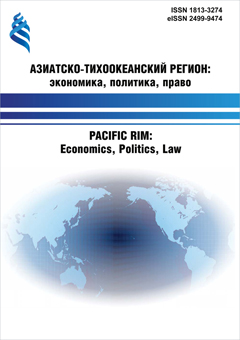ON THE CRITERIA FOR THE SEPARATION OF INSTITUTIONS OF A SPECIAL PART OF CRIMINAL LAW
Original article
DOI:
https://doi.org/10.24866/1813-3274/2021-4/145-153Keywords:
special part of criminal law, criminal law institute, classification of crimes, object of criminal law protection, interest, benefit, systematization, normative prescription, public relations, branch of law, basis of law, legal thinking, functions of criminal law, legal fact.Abstract
The article highlights significant issues of systematization of institutions of a special part of criminal law, searches for a reliable and objective criterion according to which their isolation is possible in the structure of the industry. The study proves that the unification of the entire array of criminal law institutions belong either to legal communities serving the categories of the general part, or to legal communities regulating responsibility for crimes of various types, is methodologically incorrect. In this connection, the idea of a separate analysis of the institutions of the general and special part of criminal law looks more fruitful. Meanwhile, the solution of issues of gradation and systematization of institutions of a special part of criminal law based on ideas about the subject of criminal law regulation or based on the classification of crimes is unpromising. Institutions of a special part of criminal law can be represented as a system of normative prescriptions grouped on the basis of legal goods and interests subject to criminal law protection and institutionalized in the system of public relations.
Downloads
References
Бабаев, М. М. «Мёртвые» нормы в Уголовном кодексе: проблемы и решения / М. М. Бабаев, Ю. Е. Пудовочкин // Уголовное право. – 2010. – № 6. – С. 4–10.
Жук, М. С. Институты российского уголовного права: понятие, система и перспективы развития: дис.. … д-ра юрид. наук / М. С. Жук. – Краснодар, 2013. – 380 с.
Курс уголовного права : в 5-ти т. Т. 1 : Учение о преступлении / под ред. Н. Ф. Кузнецовой, И. М. Тяжковой. – Москва : Зерцало-М, 2002. – 624 с.
Лопашенко, Н. А. Введение в уголовное право : учебное пособие / Н. А. Лопашенко. – Москва : Волтерс Клувер, 2009. – 224 с.
Мальцев, В. В. Курс российского уголовного права. Общая часть. Т. II : Уголовный закон : научное исследование / В. В. Мальцев. – Москва : Юрлитинформ, 2016. – 532 с.
Понятовская, Т. Г. Концептуальные основы системы понятий и институтов уголовного и уголовно-процессуального права / Т. Г. Понятовская. – Ижевск : Изд-во Удмуртского ун-та, 1996. – 231 с.
Пудовочкин, Ю. Е. Учение об основах уголовного права Ю. Е. Пудо-вочкин. – Москва : Юрлитинформ, 2012. – 240 с.
Тенчов, Э. С. О принципах и основаниях закрепления в законе системы уголовно-правовых институтов // Направления уголовной политики в борьбе с преступностью: межвуз. сб. науч. тр. – Свердловск : Изд-во Свердл. юрид. ин-та, 1986. – С. 22–27.
Филимонов, В. Д. Охранительная функция уголовного права / В. Д. Фили¬монов. – Санкт-Петербург : Юридический Центр Пресс, 2003. – 198 с.



